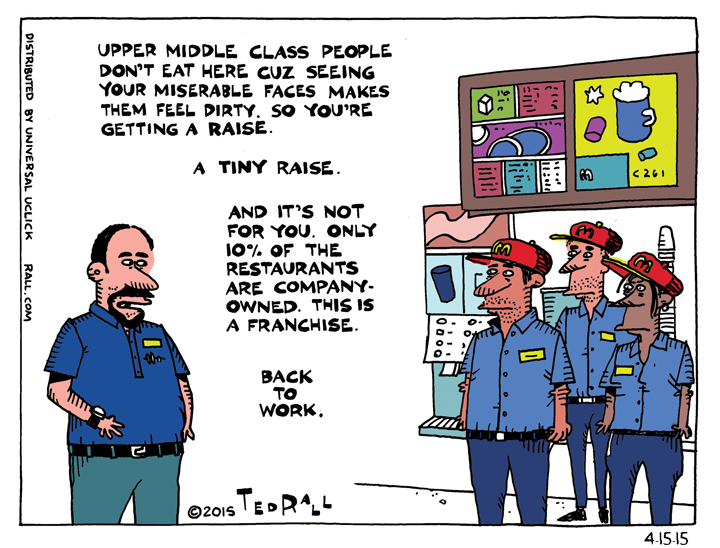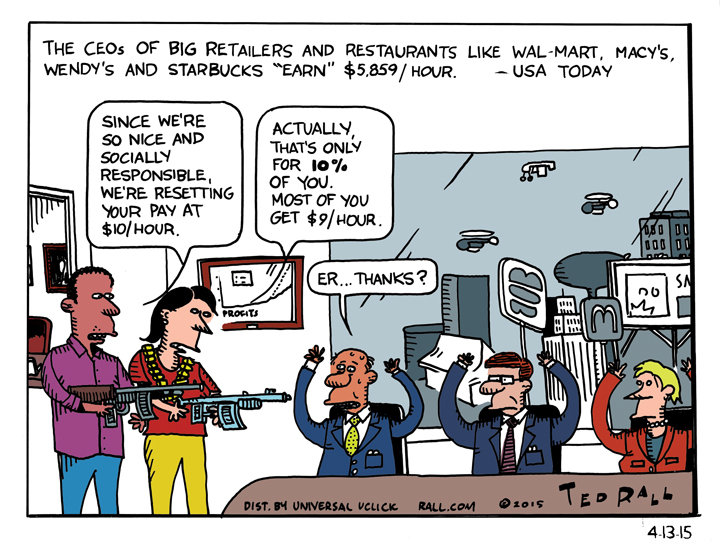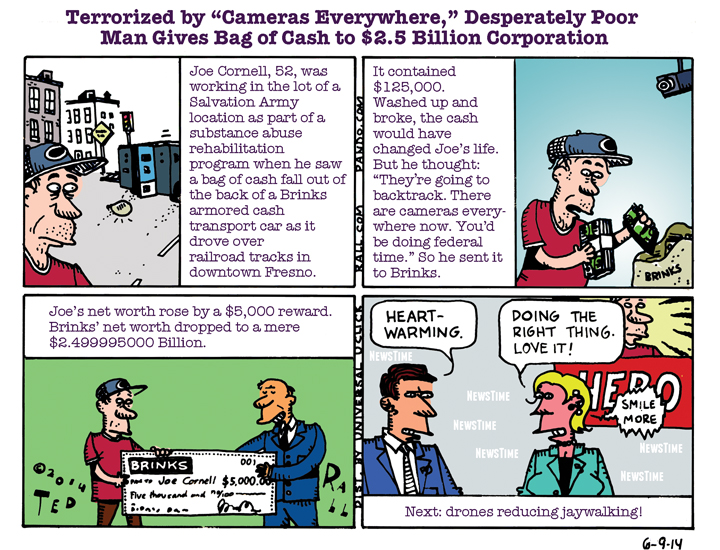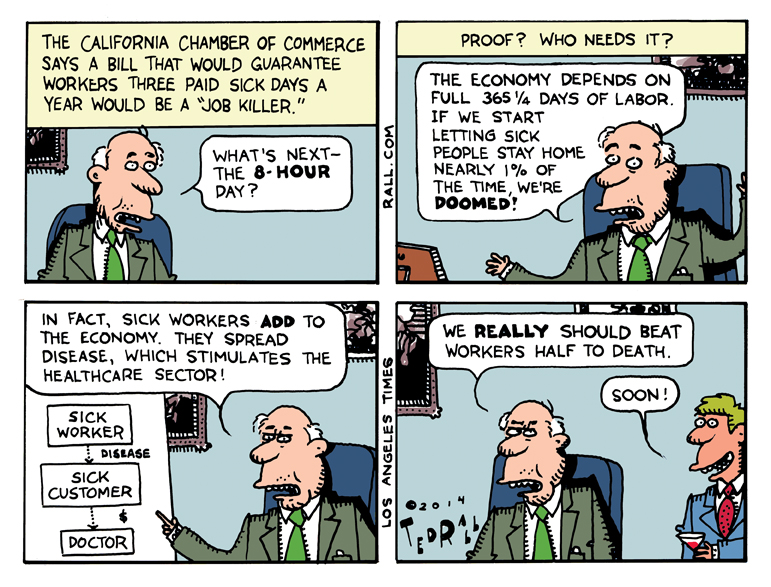 I never thought I’d live to be this old (52). I never thought that, if I lived to be this old, I’d still be so scared.
I never thought I’d live to be this old (52). I never thought that, if I lived to be this old, I’d still be so scared.
I’m white, male, able-bodied, educated, tall. Got a solid resume. I’m relatively adaptable. I started out as one of hundreds of professional political cartoonists. Now there are fewer than 20. Yet I’m freaked out.
I’ve survived poverty, getting mugged and being shot at and managed to remain pretty calm. But I’m more worried now.
Given how relatively good I have it, I can’t imagine how freaked out everyone else must be. Like, for example, black people when they get stopped by cops. Or Tamir Rice’s parents.
There are countless anxiety-inducing news stories tailor-made for this news junkie with a special interest in economics and the Middle East. This week alone, the Saudi-Iranian proxy war in Yemen widened into a full-fledged Sunni-Shia diplomatic rift over the execution of a Shia cleric. Scary. Then there’s the falling stock market, which controls me, over which I have no influence, and against whose effects I am unequipped to protect myself. The boom-bust cycle of capitalism is giving us bigger, more frequent troughs punctuated by shorter boomlets whose benefits all go to the top 1%.
I can’t believe anyone likes capitalism. Most people are a paycheck away from homelessness. Jobs are scarce. Jobs keep paying less. Bosses keep getting meaner. Everything gets more expensive.
Capitalism is so depressing it makes one nostalgic for Soviet-era queues for toilet paper.
In what is in danger of becoming a pattern for me, I have to apologize to the Baby Boom generation, specifically for rolling my eyes when Boomers whined about turning 50. That’s when you lose your job, can’t find a new one, struggle to care for aging parents while feeling your own body start to fall apart. They were right. The fifties are a bitch. (Though fiftysomething Gen Xers have less cash than they did.)
To mangle Hunter S. Thompson, last year got weird. I’m trying to go pro, but I’m not sure what that means.
2015 was the year when what used to be my boring safe job, drawing political cartoons, became more dangerous than my other job, part-time war correspondent.
Psycho gunmen slaughtered my colleagues at Charlie Hebdo, making France the nation where a journalist was most likely to get murdered in 2015. More psycho gunmen tried to shoot up a right-wing anti-Muslim cartoon contest in Garland, Texas, only to get themselves killed by the local SWAT team. There were always death threats; now they’re scarier and more specific.
After Charlie and Garland, you’d think newspapers and magazines would have rallied around what’s left of American editorial cartooning. There is zero, zip, nada support for American cartoonists by editors or publishers. Post-Charlie, they all wrote passionate editorials defending free speech. They said nice things about cartooning. While they fired more cartoonists. Refused to hire any. Stopped printing them.
The cowards didn’t even reprint the Charlie cartoons so their readers could see what the fuss was about.
The annual convention of the Association of American Editorial Cartoonists in Columbus inaugurated the new normal: police police police, police dogs, police snipers on the roof. When I went on tour to publicize my book Snowden, security became a routine part of the equation — for the first time in nearly 20 books.
No wonder no one under 30 wants to become a political cartoonist. Not only is there no work and no respect, your impoverished ass might get shot with an AR-15.
So then a few weeks ago I looked at my chest. I probably do this more than you do, because a wart on my chest once nearly killed me. I noticed a new bump. A growing new bump. I found myself in the somewhat ridiculous role of the first male in three weeks to pass through the automatic doors of the rhodamine-pink special Breast building at my hospital. I’m anti-sexist. Still, it does something to a man to be quizzed about his menstrual and lactation histories. Not to mention worrying about the possibility of becoming one of the couple of thousand American men who get breast cancer each year — you just know the system isn’t set up for that.
Fortunately, I dodged that bullet. Just a lipoma.
A bullet that hit me square in the chest last year, albeit metaphorically, was fired by Nick Goldberg, an editor at The Los Angeles Times. He accused me of lying in his newspaper, a grave offense in journalism unless your name is Bill O’Reilly, and fired me. I hadn’t lied. He was wrong. After I presented proof that I’d told the truth, the Times — under pressure, since the Internet was going crazy due to their disgusting refusal to reconsider — didn’t issue a retraction or hire me back. Presumably fearing a lawsuit, they doubled down. Goldberg still draws a salary. Not me.
I used to be a sound sleeper. Head hit the pillow, I was gone until morning.
No more. Insomnia is my new normal. I’m jittery, nervous, distrusting. Lots of nightmares. If you can be so totally wronged, libeled by a corporation that’s literally trying to destroy your career because of its opaque conflict of interest with outside parties (the Los Angeles Police Department), and it doesn’t make any difference when you prove you’re innocent, where common sense and human decency no longer hold sway, well, that’s a weird, unsettling world where you can never relax. If I get four hours a night, that’s better than most.
The thing that surprises me most about workplace shootings is that there are so few of them.
Under the doctrine that 2015 sucked so hard, 2016 has got to be better, I’m cautiously optimistic about the coming year. Yet anxiety remains.
My new graphic biography Bernie is about Bernie Sanders. Sales figures will be directly proportionate to the senator’s performance in the primaries. There’s cause for optimism in New Hampshire but the South is a challenge and now you’ve got The New York Times skewing expectations by suddenly claiming that the Iowa caucuses are do or die for Bernie, even though no one thought he was going to win there before. It’s Hillary’s campaign to lose. I knew that. But it was hers to lose in 2008, and she did.
What if Bernie crashes and burns? Then my book dies. Or what if Bernie becomes the nominee, and the book gets huge — will there be enough security? If not, I die. Anxiety turns everything into a lose-lose.
Behind all that anxiety, of course, is money. Not enough of it.
Every month that I manage to pay all the bills is a miracle. I move money around, scare up just enough extra work, hustle hustle hustle. My colleagues marvel at my energy. What’s my secret? Being tired all the time, and depressed, and not knowing how I’ll be able to eat in 10 years, much less retire. Probably like you.
Like most Americans, I don’t have substantial retirement savings. If I don’t work, I live maybe a year or two before moving to the great outdoors.
I fantasize about a soft landing. Maybe some magazine or website or newspaper will take me on full-time. Maybe with benefits? It’s OK, I don’t need benefits.
Or an academic gig — teaching journalism or cartooning or history somewhere. It would be fun. I’d be good at it. But where? How? You can’t apply to a college or university; the academic job application process is insanely time-consuming and the reply is always a rejection. An offer has to come to you.
One must trust in the universe. The philosopher Eckhart Tolle says the universe will provide what you need.
Unless it doesn’t.
(Ted Rall, syndicated writer and the cartoonist for ANewDomain.net and SkewedNews.net, is the author of “Snowden,” about the NSA whistleblower. His new book “Bernie” about Democratic presidential candidate Bernie Sanders, is now available for pre-order. Want to support independent journalism? You can subscribe to Ted Rall at Beacon.)
COPYRIGHT 2016 TED RALL, DISTRIBUTED BY CREATORS.COM









